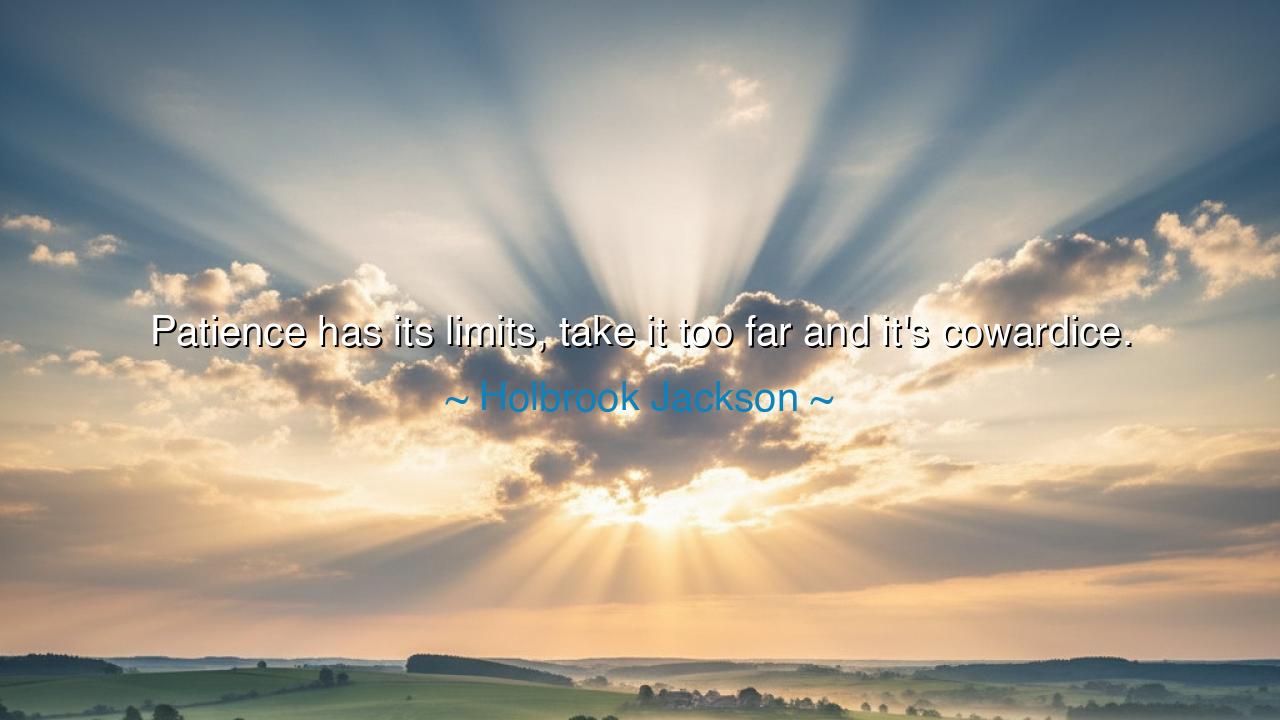
Patience has its limits, take it too far and it's cowardice.






The words of Holbrook Jackson—“Patience has its limits, take it too far and it's cowardice”—strike like a double-edged sword, cutting through the confusion between strength and weakness. Patience is a virtue, a shield against anger, a guardian of wisdom. But like all virtues, when twisted beyond its true purpose, it ceases to be strength and becomes vice. To endure injustice forever without resistance is not noble—it is surrender. To tolerate cruelty without protest is not wisdom—it is fear disguised as virtue. Jackson warns us that patience, though golden, must not harden into chains.
The origin of this truth lies in the paradox of human endurance. Civilizations have often praised patience as the mark of saints, rulers, and sages. Yet history also reveals that there comes a moment when patience must give way to action, when silence must be broken by a cry of defiance. Patience has its limits, for it is meant to guide us through storms, not to bind us to slavery. If we extend it beyond its natural boundary, it ceases to protect dignity and begins to erode it.
Consider the story of Mahatma Gandhi, whose philosophy of nonviolence was built upon patience and restraint. Yet Gandhi himself was not endlessly passive; his patience was purposeful. When faced with the British Empire, he endured insult after insult, but only to prepare for decisive acts of resistance—marches, boycotts, protests that shook the throne of empire. Had he chosen to wait forever, to endure without end, his patience would have become cowardice, and his people would have remained in chains. His greatness lay not in infinite endurance, but in knowing when patience must end and courage must rise.
Likewise, in the days of World War II, patience with tyranny nearly brought ruin. The appeasement of Hitler in the 1930s was cloaked in the language of diplomacy, restraint, and patience. Leaders told themselves they were buying peace. But that patience became cowardice, and cowardice became disaster. It was only when patience gave way to resolve, when nations took up arms in defense of freedom, that tyranny was broken. Here history teaches us: patience is sacred, but when taken too far, it is betrayal of justice itself.
This wisdom is not only for nations, but for individuals. In our lives, we are often told to be patient—with hardship, with unkindness, with delay. And indeed, patience shields us from rash choices and teaches endurance. But if we remain patient with abuse, patient with oppression, patient with the erosion of our dignity, then patience becomes cowardice. There comes a moment when patience must end, and the fire of courage must begin. To know this boundary is the mark of wisdom.
The lesson for us, then, is to wield patience like a bowstring: taut, controlled, ready. It is not meant to remain stretched forever, for if never released, the arrow will never fly. Practice patience with life’s trials, but do not allow it to chain you to suffering that can and must be changed. Endure when endurance preserves peace, but resist when endurance destroys justice. The measure of patience is not its endlessness, but its purpose.
In practice, this means asking yourself: Am I patient because I am wise, or because I am afraid? If your patience shields you from anger and gives you time to act with clarity, it is virtue. But if your patience excuses cowardice, if it silences your voice when it should be raised, then it is no longer patience but surrender. Do not allow the name of virtue to conceal the face of fear.
So let Jackson’s words be remembered as a fiery command: “Patience has its limits, take it too far and it’s cowardice.” Patience is a mighty ally, but it is not endless, nor should it be. Know when to endure, and know when to rise. For the man who waits forever accomplishes nothing, but the one who endures until the right moment and then acts with courage changes the course of the world.






AAdministratorAdministrator
Welcome, honored guests. Please leave a comment, we will respond soon